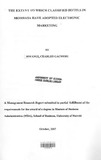| dc.description.abstract | Hotel industry is an important part of the tourism sector which makes a significant
contribution to the country's economic development in terms of foreign exchange
earnings, government revenues and generation of employment and business
opportunities. This industry .experiences challenges in terms of high .competition and
fluctuating demand. To counter these challenges, the hotels have adopted different
strategies, one of them being the use of internet as a marketing tool. This study was
aimed at establishing the extent to which classified hotels in Mombasa have adopted
electronic marketing. The sampling frame was drawn from classified hotels as listed
in the Kenya Gazette Notice of July 2004.
The objectives of the study were to determine the extent to which classified hotels in
Mombasa have adopted E-marketing, to establish the benefits these classified hotels
derive as a result of adopting E-marketing and finally, to establish the challenges
these hotels experience in the adoption of E-marketing. The study was carried out
using a descriptive study. The population of interest in the study consisted of all the
16 classified hotels in Mombasa. Primary data was collected using semi-structured
questionnaires. The questionnaires were dropped and picked later. The respondents
were Marketing Managers or their equivalent. The response rate was 100%.
Descriptive statistics was used to analyze the data. Frequency distribution tables,
mean score, percentages and standard deviation were used to achieve the objectives of
the study.
The study found that most of the hotels are using"tinternet in marketing activities such
as marketing information system, target marketing and marketing mix. The hotels use
internet as a marketing information system to a large extent; as target marketing to a
moderate extent and in marketing mix activities to' a large extent. The study also
established that these hotels have benefited from the use of internet in terms of cost
savings, interactivity, connectivity and accessibility. Apart from the benefits, internet
poses some challenges to the users. These challenges can be termed as technology
related, organizational, moral and governmental factors.
It was recommended that the hotels should improve their service delivery, facilities
and amenities so that they can be upgraded to Star Five. Second, hotels which have
not embraced technology should do so. Third, the hotels which do not have
marketing department should create one and finally, the hotels which are wholly
locally owned should partner with foreign investors so as to realize growth and
efficiency.
Only 16 classified hotels in Mombasa were studied. This may not representative of
the 123 classified hotels in Kenya. It is also acknowledged that this approach does
not fully account for the perspectives of other major players in service encounter, for
instance, customers. A similar study, therefore, should be conducted on all the 123
classified hotels in Kenya. There is also a need to conduct a study to establish whether
there is any correlation between the extent of internet adoption and different hotel .
classification. | en |

